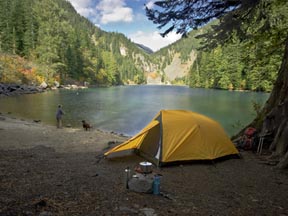School’s out and vacation season is under way. That means people are camping, hiking, boating and otherwise spending time in the woods where they just might be meeting up with its usual denizens.
 “We’ve seen a few more cases of snakebite than usual in the emergency department this spring, but it’s still a remarkably small number, less than 10,” says Janyce Sanford, M.D., chair of the Department of Emergency Medicine at the University of Alabama at Birmingham. “People have a much greater chance of being stung by a bee or wasp or being bitten by a tick.”
“We’ve seen a few more cases of snakebite than usual in the emergency department this spring, but it’s still a remarkably small number, less than 10,” says Janyce Sanford, M.D., chair of the Department of Emergency Medicine at the University of Alabama at Birmingham. “People have a much greater chance of being stung by a bee or wasp or being bitten by a tick.”
The best way to avoid snakebite is to watch carefully were you put your hands and feet and wear long pants and boots in the woods, Sanford says. If you are bitten, the best remedy is probably in your pocket.
“Car keys are usually the best treatment for snake bite,” says Kimberly Gran, M.D., assistant professor of pediatric emergency medicine at UAB who staffs the emergency room at Children’s of Alabama. “Get the victim to an emergency department as quickly as possible.”
There is an antivenin physicians can use when called for, but not every bite requires it. Not every snake is venomous, and about one in three bites from venomous snakes will be dry, meaning the snake doesn’t inject any venom. Snake bites are not always fatal; those at increased risk are the very young, the very old and those with underlying medical conditions.
Gran, who is a certified wilderness medicine instructor, says old practices such as cutting open the puncture marks, or using a suction device to remove venom have been discredited. Take a picture of the snake if you safely can and hustle to the ED.
“Don’t bring the snake with you. The last thing we need in a crowded emergency room is a snake, dead or alive,” Gran says.”
Ticks and mosquitos are much more commonly encountered critters. An insect repellant with DEET, along with long pants and long-sleeved shirts are the best ways to ward off pesky insects, Gran says. DEET with a concentration of 10 to 30 percent is approved for use on children ages 2 months and older. She says 10 percent DEET will last about two hours, and 24 percent DEET lasts around five hours. Picardin is another bug repellent that is safe; it is effective on mosquitos, but not ticks.
Ticks in Alabama are known to carry the bacterium that causes Rocky Mountain spotted fever, but the likelihood of getting Lyme disease is low in this region, according to Sanford. Rocky Mountain spotted fever is characterized by a red, raised rash on the wrists or ankles. The best way to remove a tick, she says, is to use tweezers and pull straight up in an easy motion.
“One of the biggest outdoor risks is bee or wasp stings, especially for those with severe allergic reactions,” Sanford says. She recommends carrying an epinephrine auto-injector, commonly known as an EpiPen, when camping or hiking, especially if anyone in the group has ever reacted badly to previous stings. “A severe allergic reaction, known as anaphylaxis, can be fatal.” EpiPens require a prescription from your family doctor and can be purchased at a drug store.
Another summer hazard is poison ivy, which while not life threatening, can certainly make life miserable for several weeks. Gran says learn to recognize poison ivy (“leaves of three, let it be”), and Benadryl can help reduce the itch. Ivy blocks, used before exposure, and ivy soaps, used immediately after exposure, can help reduce the effects of the noxious vine.
Both Sanford and Gran say a good first-aid kit is a must for anyone planning on spending time outdoors. You can buy ready-made kits at outdoor stores or stock your own. You’ll want assorted bandages and basic medicines such as Tylenol, Benadryl and aspirin. Albuterol will help with group members who have asthma or COPD. Include a 1 percent hydrocortisone anti-itch cream, foldable splints, alcohol wipes and cleaning agents.
Gran suggests a couple of not-so-obvious items to include in your kit. A square bandana makes a great sling, safety pins can be indispensable and duct tape can fix just about anything in the short term and can even be used to hold a wound closed in an emergency.
Sanford says use a little planning before heading off to woods or mountains. Research your destination and know what you are likely to find. Be aware of the strengths and weaknesses of your group. Who has allergies? Who knows CPR? Are there any special needs to be considered?
Bring plenty of water or a good water-filtration system if you are going to be out in the wild for several days. Proper clothing, rain gear and emergency food supplies will help keep an unexpected event from turning your outdoor vacation into a hospital visit.
“Common sense and a little thought before you venture out will help make your outdoor adventure one to remember fondly,” says Sanford.